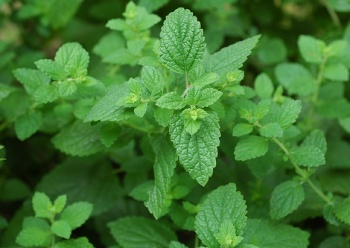Lemon Balm
Other Names: Balm, Bálsamo de Limón, Cure-All, Dropsy Plant, Honey Plant, Melisa, Melissa, Melissa officinalis, Melissae Folium, Mélisse, Mélisse Citronnelle, Mélisse Officinale, Melissa officinalis, Melissenblatt, Monarde, Sweet Balm, Sweet Mary, Toronjil
Lemon balm is a relatively common part of the mint family, one with a lemony scent and flavor. This plant is sometimes called 'bee balm', and its nectar-filled blossoms give plenty of reason for the appellation, but should not be confused with the plant in the Monarda family more commonly called by that name.
Special Precautions of Melissa
- When taken by mouth, lemon balm can cause some side effects including nausea, vomiting, abdominal pain, dizziness, and wheezing.
- When applied to the skin, there is one report of irritation and one report of increased cold sore symptoms.
- Children. Lemon balm is POSSIBLY SAFE when taken appropriately by mouth for short periods of time.
- Surgery: Lemon balm might cause too much drowsiness if combined with medications used during and after surgery. Stop using lemon balm at least 2 weeks before a scheduled surgery.
- Lemon balm may inhibit the action of thyroid medications.
- Sedative medications (CNS depressants) interacts with LEMON BALM
- Eugenol can be potentially dangerous when ingested in higher amounts. It is hepatotoxic and can have several dangerous side-effects.
The benefits of Melissa are
Chemical compounds in lemon balm include eugenol, antioxidants, rosmarinic acid, and citronellal. These have strong natural antiviral, antifungal, sedative, and antispasmodic properties that lend themselves to a number of natural remedy purposes.
- Moods : For many people, taking Melissa herbal supplements helps them improve levels of relaxation and better their mood. It's a bit similar to lavender, which also has soothing as well as antiseptic qualities. Whether used as an aromatherapy oil, swallowed as a herbal supplement or used as a topical ointment, it can help get you in a better mood.Scientific studies have proved that Melissa works. In one of the most recent one, volunteers were given either a placebo or extract of lemon balm in a recent study to see if their moods improved and anxiety levels decreased. The outcome was a positive one, largely because the herb is instrumental in helping the nervous system to relax.
- Insomnia : Melissa has been used for centuries to treat people for insomnia. However, in recent placebo-controlled trials conducted in humans it was mixed with other herbal supplements known to promote sleep, such as valerian. It is still unclear whether Melissa can work as a natural sleep aid on its own, but it is thought to work by relaxing the nervous system, which in turn decreases anxiety levels and helps with a peaceful sleep.
- antiviral activity against a variety of viruses, including herpes simplex virus (HSV) and HIV-1
- Cold Sores : Melissa has also been know to help people with Cold Sores, and ointments containing lemon balm are often applied to children with cold sores around the world. In recent trials, adults with cold sores who applied an ointment containing lemon balm to their lips saw redness and swelling subside, although pain and scabbiness did not decrease. More tests are underway, but is so effective that a herpes remedy containing lemon balm is already popular in Germany.
- Digestive Disorders : Ayurveda promotes its use for digestive disorders due to nerves, and it has been widely used to soothe the stomach in other traditions.
- Alzheimer and Dementia : Used to calm those with severe dementia.
- Aromatherapy for Pitta Imbalance.
Medical Disclaimer
This information is not meant to be substituted for medical advice. Always consult a medical professional regarding any medical problems and before undertaking any treatment or dietary changes.
